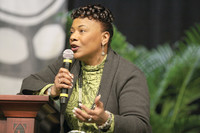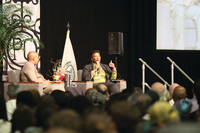

PROVIDENCE — Bernice King, the youngest daughter of the Rev. Dr. Martin Luther King, Jr., and Coretta Scott King, addressed the Providence College community on Thursday, January 18, in an event commemorating the life and legacy of the civil rights leader and nonviolent activist who died 50 years ago this spring.
King, who serves as CEO of the Martin Luther King Jr. Center for Nonviolent Social Change, spoke about her father’s approach to the civil rights issues of his time and how his philosophy of nonviolence was rooted in a spirituality that looked on all people as part of a larger human community.
“Many times when people speak about my father, they speak merely on one dimension,” she said. “My father was holistically concerned about the human soul.”
King went on to address the divisiveness and polarization that characterizes the politics and social movements of the United States today. Referring to the “beloved community” of social equality often spoken about by her father, she encouraged individuals on all sides of social issues to reach out to others beyond the separation of opposing viewpoints, even when complete agreement is not possible.
“There’s no such thing as an absence of conflict in the beloved community, but there is something we all can embrace and that’s nonviolence,” she said. “It means that when I approach anything that separates and divides us, I must not look at you as an enemy or an adversary or as a stranger, but I must look at you in the eyes of God.”
She also told listeners that in today’s political and social climate, we focus too much on personality and not enough on the issue at hand.
In the case of racial tensions that have become inflamed in recent times, she told listeners the issues precede the current president and can be traced back to the nation’s founding.
She also encouraged the cultivation of moral and spiritual identity and the acknowledgement that in the civil rights movement, each individual is part of a larger whole.
“My father had hope because they were not fighting alone. They had this constant companion in the person of God fighting with them,” she said. “Dr. King understood that he was a vessel in the struggle for freedom and justice and righteousness.”
Following the presentation and a question-and-answer session with students, King further discussed her views on the civil rights movement with local press, responding to a question from Rhode Island Catholic regarding the Catholic Church’s role in furthering racial equality.
“I think the first step [is] every community has to first look at what role I’ve played in being complicit and begin to acknowledge that. Because the first step to true healing is acknowledgment in what role did I play in the issue,” she said.
She also encouraged Catholic universities to create more opportunities where students, faculty and staff can discuss civil rights issues across lines of difference.
“I think it’s important that the Catholic universities understand the importance of creating that opportunity to hear and not just speaking,” she said. “We have to overcome that separation chasm and be intentional about having these conversations.”
Adriel Antoine ’18, president of the campus chapter of the NAACP, told Rhode Island Catholic following the event that King’s visit to campus came at an appropriate time in the school’s and country’s climates. Her words, he said, were received positively on a campus where her message of overcoming division resonated strongly among students.
“In general at Providence College, there’s always been a racial tension,” said Antoine. “Every year there’s constantly something that happens that just ends up dividing the student body somehow.”
Over the past few years, several incidents, including the posting of an offensive image and racial slur to Snapchat by a Providence College student and a 2016 sit-in by students outside the office of President Father Brian Shanley, have highlighted ongoing racial tensions on the predominantly white campus. While administrative actions such as the elevation of the college’s chief diversity officer to an associate vice president position have heartened diversity leaders in recent months, Antoine said faculty and students continue to work with administrators to ensure a campus environment of racial equality.
“If we hold ourselves accountable and actually put our words into actions, that will help us,” he said.
The event, part of the college’s first Rev. Dr. Martin Luther King Jr. Convocation Week, was preceded by the presentation of the first MLK Vision Award, intended to recognize a member of the Providence College community who has exemplified Dr. King’s ministry surrounding civil rights issues. The award was presented to Dr. Francis MacKay, Dr. René Fortin (posthumous), Rev. Robert Morris and Dr. Mark Rerick (posthumous). The faculty members were the originators of the Rev. Dr. Martin Luther King, Jr. Scholarship, a full-tuition multicultural scholarship program that has served close to 700 students since its creation in 1968.